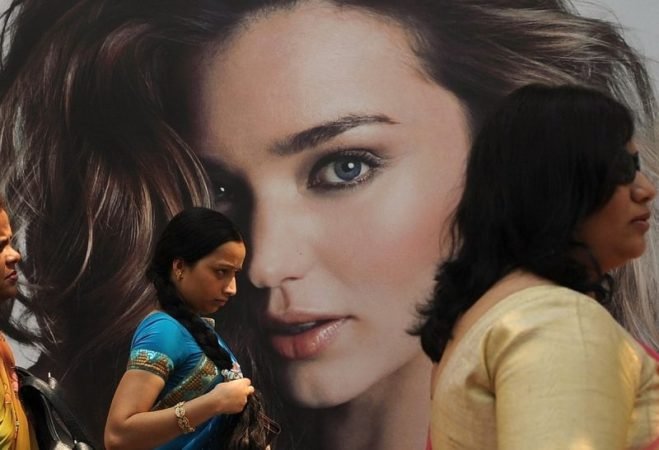Color – A persistent social vulture

In a country where the two most revered Hindu deities – Krishna & Shiva are the colour of a beautiful night sky, black color or dark skin still connotes blemish rather than beauty in India. People do have a proclivity to perceive someone with darker skin as more likely to have committed an immoral act, regardless of the person’s race. Even in a country like the United States, dark-skinned people have lower socioeconomic status, more punitive relationships with the criminal justice system, diminished prestige, and less likelihood of holding elective office compared with their lighter counterparts. Colour prejudice is an offshoot of the bigger evil of casteism in India. The hold of the caste system in India is deep, dark skin is the skin of the lowest castes, traditionally the subjugated people and, therefore, disagreeable.
The country’s foreign rulers, whether Mughal or British, were also light-skinned and this has contributed to shaping social attitudes in India. Fairness as an obsession even in the 21st century can be tied down to a deep sense of subservience to colonial rulers and arising from it an uncanny fetish to be like them — idealising their ways of life, their characteristic style and even their physical attributes.
In 1994 Time magazine ran a controversial cover photo of O.J. Simpson’s mugshot that, to some readers, seemed to have been intentionally altered to make Simpson’s skin look darker than normal. Accompanied by the headline “An American Tragedy,” Time was criticized for manipulating Simpson’s appearance to make him seem menacing, and therefore more likely to be guilty of his accused crimes. This caused a great upheaval socially and the magazine’s then editor had to issue a public apology. ‘Colour-sickness’, however, seems to be a worldwide phenomenon. Recently, Canadian Prime Minister Justin Trudeau was in the news for the wrong reason during an election campaign. As a 29-year-old teacher, Trudeau appeared in blackface at an Arabian Nights fundraiser at his school. When he was young, he even performed in blackface at high school talent shows. Severe backlash and criticism prompted Trudeau to apologise in a tweet. Closer home, in an article, Modern Mythmaking, author and mythologist Devdutt Pattanaik reflect on how, “we were introduced to the politics of colour very early on in our lives, in the most surprising of places – in children’s comic books.” The comical depictions of Indra, Brahma and Durga have them in pink skin tones while the demons, Asuras and Rakshasas, are painted brown. And Vishnu, Ram and Krishna are blue. The article further states that “somehow, an unnaturally blue Krishna was preferred over a naturally dark Krishna. Because blue is the colour of the sky, of ether, of divinity.”
Various studies by professor Adam Alter of New York University showed a link between skin tone and perceptions of whether a person committed a criminal act. The researchers demonstrated a psychological link between darkness and badness by running several experiments where participants were asked to choose between headshots to identify a perpetrator. Online participants first examined two different grainy video surveillance images, alongside a brief sentence describing what the man in each image was doing either before or after the image was taken. The researchers found that participants who held more negative attitudes towards darker-skinned minorities, such as African Americans, were more likely to choose the darker photograph when asked who committed the immoral act. A more startling pattern emerged when the researchers analyzed people’s headshot choices based on what “color” they thought the men’s souls were. Even after statistically controlling for participants’ racial attitudes, the researchers found that participants who thought the man who committed the immoral act had a darker colored soul were also more likely to think he had darker colored skin. In other words, regardless of race, dark skin was associated with evil in the minds of people who saw a link between darkness and badness. This “bad is black” effect may have its roots in our deep-seated human tendency to associate darkness with wickedness. Across time and cultures, we tend to portray villains as more likely to be active during night time and to don black clothing.

Dark is Beautiful advocacy campaign by Kavita Emmanuel drove the Advertising Standards Council of India to issue guidelines in 2014, communicating that “ads should not reinforce negative social stereotyping on the basis of skin colour” or “portray people with darker skin (as)… inferior, or unsuccessful in any aspect of life particularly in relation to being attractive to the opposite sex”. A 2015 report by professors at Southern Illinois University and the Rochester Institute of Technology found that in India a woman’s dark skin can preclude her from entering positions such as news anchor, sales associate, flight attendant and even receptionist because these jobs require exposure to and interaction with the public, who will judge her as unattractive, unworthy and incompetent. Fair-skinned women, conversely, are seen in most of these roles; their skin tone grants them unearned privilege and power within organizations as a result. Emmanuel says many Indians now expressing support for Black Lives Matter in the U.S. are blind to colorism, caste discrimination and violence against religious minorities at home. Many of the same celebrities tweeting about racial justice in the U.S. have actually starred in ads for skin-lightening creams does infer that color is a prevalent social vulture even in the 21st century. Looking at India in the mirror of American protests makes clear that India too needs urgently to address its glaring problems of systemic discrimination and police brutality. It also makes clear how far India is from fighting for such changes. According to the World Health Organization, about half of all skincare products in India are lighteners designed to “brighten” or “lift” — essentially to whiten — a user’s skin color. WHO estimates that such products amount to about a $500 million industry in India alone. A recent step taken in this direction by the IT industry in changing the nomenclature so as to not sound racially or socially discriminating can be seen in primary and secondary servers to be used instead of master and slave servers and Allow list or Block list instead of a White list and blacklist does seem a step in the right direction.
We have internalized all the prejudices, thus believing that anybody with fairer skin is supposed to be better off than a dark-skinned person. These stereotypes have been reinforced in India for millennia. But modern ideas of racial equality — and the Black Lives Matter movement — are slowly making a dent. A landmark case against caste discrimination is currently under litigation in California, where Indian American tech workers are accused of discriminating against a colleague because he’s a member of a lower caste. Shaadi.com issued a statement saying that it “does not discriminate” and that the skin color filter was a “product debris left-over in one of our advanced search pages.” Fair & Lovely’s manufacturer, Unilever, made an announcement – It is removing any references to “fair/fairness,” “white/whitening” and “light/lightning” from all of its packaging. “We are fully committed to having a global portfolio of skincare brands that is inclusive and cares for all skin tones, celebrating greater diversity of beauty,” Sunny Jain, president of the company’s beauty and personal care division, was quoted as saying. “We recognize that the use of the words ‘fair,’ ‘white’ and ‘light’ suggest a singular ideal of beauty that we don’t think is right.”
Although in the right direction, these measures seem to be still far fetched from making a difference because the question still remains as to how long these skin-lightening products — whatever they’re called — will remain in India, along with the attitudes behind them.


















